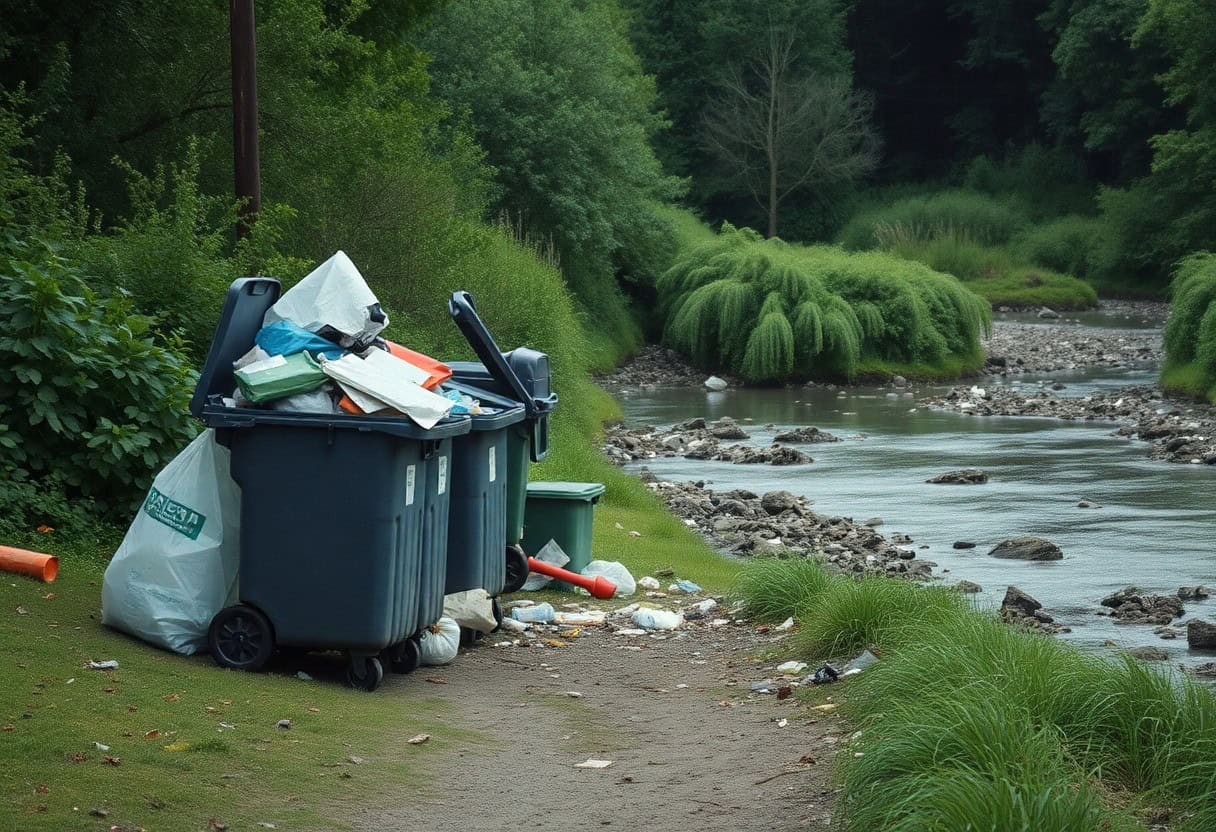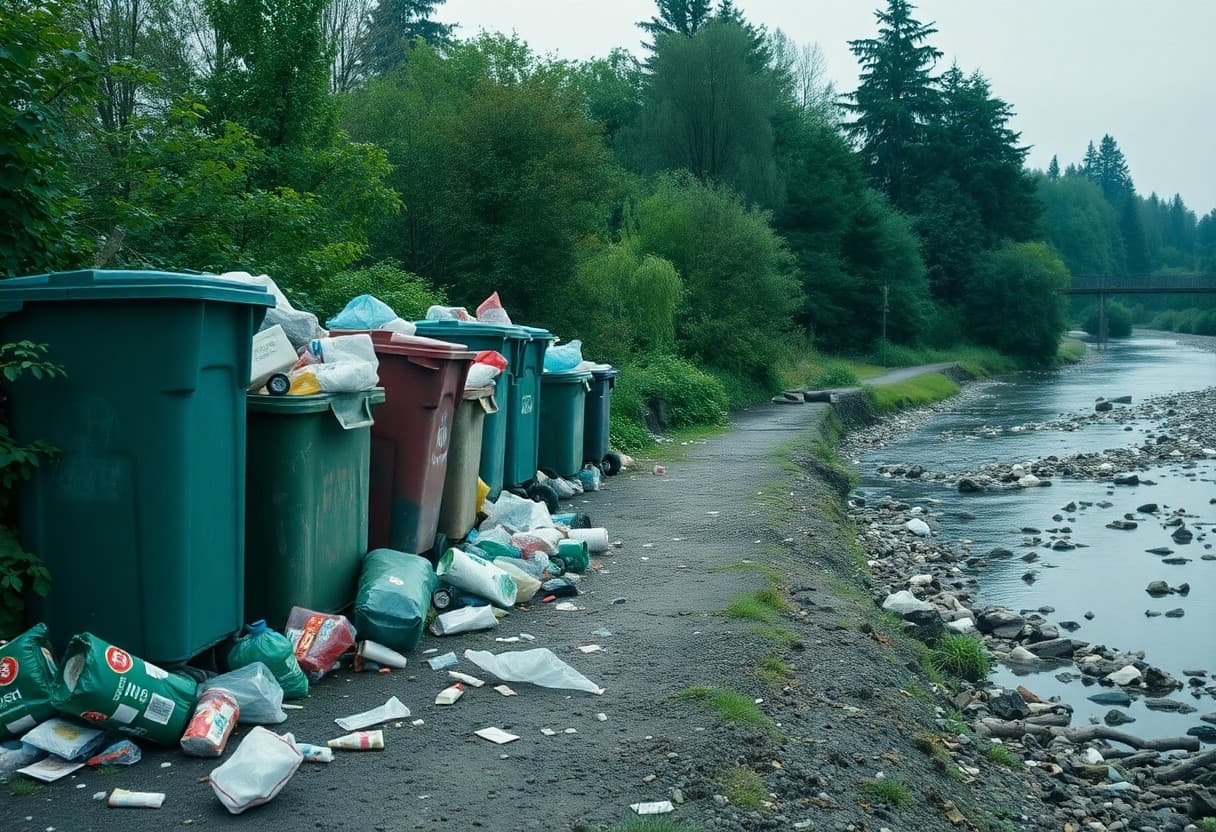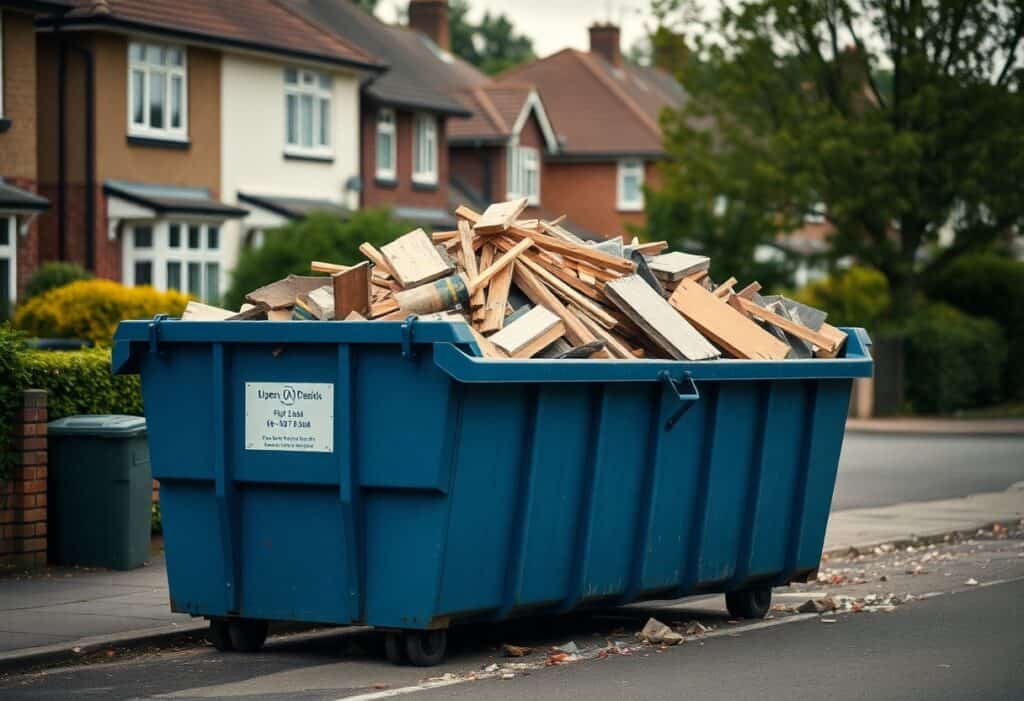Surrey is facing significant challenges due to improper waste disposal, which has detrimental effects on both the local environment and your community. When waste is not disposed of correctly, it can lead to pollution of water sources, harm to local wildlife, and contribute to climate change. By understanding these impacts, you can play a role in promoting better waste management practices, helping to create a cleaner and more sustainable environment for future generations. Your actions matter, and being informed is the first step towards positive change.
Overview of Waste Disposal Practices in Surrey
For residents and businesses in Surrey, waste disposal practices play a significant role in environmental health. Alarmingly, cases such as when the Surrey golf club took money for illegal waste dumped on … highlight the challenges faced in managing waste responsibly. Proper waste disposal methods are imperative for preventing pollution and sustaining local ecosystems.
Types of Waste Generated
Behind waste disposal in Surrey lies a diverse range of materials that require attention. The primary types of waste generated include:
| Household Waste | General day-to-day refuse |
| Commercial Waste | Business operations refuse |
| Construction Waste | Debris from building projects |
| Hazardous Waste | Dangerous materials requiring special handling |
| Organic Waste | Biodgradable materials such as food scraps |
After analysing these categories, it becomes clear that each type of waste must be treated with due diligence to minimise its environmental impact.
Common Disposal Methods
Practices surrounding waste disposal in Surrey vary widely and include several methods. Households and businesses often utilise kerbside collection, recycling centres, and commercial waste services, while some may resort to illegal dumping when proper channels are unavailable or inconvenient.
Also, proper disposal methods are imperative for maintaining a healthy environment. Using recycling systems not only reduces landfill waste but also conserves natural resources. Alternatively, relying on illegal disposal often leads to serious consequences, including fines and environmental degradation. Ensuring you engage in responsible waste disposal practices is vital for promoting sustainability in your community.
Consequences of Improper Waste Disposal
Some of the most significant consequences of improper waste disposal include environmental degradation, public health risks, and economic burdens. When waste is not managed correctly, it can lead to various forms of contamination and hazards, affecting not only local ecosystems but also human populations. As a responsible member of the community, understanding these consequences is vital in making informed decisions about waste management practices.
Soil Contamination
The improper disposal of waste can lead to harmful substances infiltrating the soil. Chemicals, heavy metals, and pathogens may leach into the ground, compromising soil quality and affecting plant growth. This contamination can have far-reaching effects, including reduced agricultural productivity and potential health risks for consumers.
Water Pollution
Below the surface, improper waste disposal poses a significant threat to water quality. Waste that enters rivers, lakes, and groundwater can introduce myriad pollutants, leading to unsafe drinking water and detrimental effects on aquatic life.
Hence, pollution of water bodies can result in serious health risks for both humans and wildlife. Contaminated water sources may carry toxic substances that can cause illness when ingested. Furthermore, ecosystems reliant on clean water suffer from decreased biodiversity and harmful algae blooms, which disrupt the natural balance. Addressing these issues is imperative for protecting your environment and ensuring the availability of safe, clean water for future generations.

Effects on Local Flora and Fauna
It is evident that improper waste disposal significantly affects the local flora and fauna in Surrey. The mismanagement of waste can introduce harmful pollutants into the soil and water systems, adversely impacting plant growth and animal habitats. For more information on managing waste responsibly, you can explore the Yard Waste and Refuse Management Strategy.
Impact on Wildlife
Below, you will learn how improper waste disposal endangers various wildlife species. The presence of toxic materials can lead to poisoning and cause severe health issues for animals that ingest or come into contact with contaminated waste. This harm extends through the food chain, affecting all living organisms.
Ecosystem Disruption
Any neglect in waste disposal practices can lead to significant ecosystem disruption. When waste accumulates, ecosystems can become unbalanced, potentially leading to the extinction of some species and the rapid proliferation of others, particularly invasive species.
Local ecosystems become vulnerable when waste is not correctly managed. The introduction of foreign materials and chemicals can alter natural habitats, affecting plant and animal life. As a result, species may either decline or migrate, leading to a diminished biodiversity that can take years to restore. It is imperative that you take action to support proper disposal methods to protect Surrey’s unique environment.
Public Health Implications
Unlike proper waste management, improper waste disposal poses significant threats to public health in Surrey. Contaminated sites can lead to hazardous waste exposure, increasing the risk of disease transmission and placing undue pressure on healthcare services. You may find that your community is more susceptible to health issues linked to environmental degradation, resulting in higher medical costs and diminished quality of life.
Respiratory and Infectious Diseases
Respiratory diseases flourish in areas where waste is not disposed of properly, often due to the presence of harmful pathogens emanating from decomposing materials. You are at risk of breathing in contaminated air, which can lead to chronic conditions such as asthma and bronchitis, while also facilitating the spread of infectious diseases that affect entire communities.
Long-term Health Risks
After continued exposure to improperly disposed waste, you may experience various long-term health risks, including organ damage and severe respiratory issues. The accumulation of toxic substances in the environment can lead to chronic illnesses that may persist long into the future.
But the consequences of long-term exposure to hazardous waste can be alarming. You may face increased chances of developing serious conditions such as cancer, neurological disorders, and reproductive health issues. These health risks are not only detrimental to your well-being but also impact future generations. Taking action to ensure proper waste disposal can significantly mitigate these dangers, promoting a healthier community for you and your family.

Community Initiatives and Solutions
To combat the adverse effects of improper waste disposal in Surrey, community initiatives play a vital role. Local councils and organisations collaborate to raise awareness, promote recycling, and encourage responsible waste management. By participating in these initiatives, you contribute to a cleaner environment and foster a sense of community responsibility. Your involvement can help drive positive change and ensure a sustainable future for Surrey.
Recycling Programs
One effective way to address waste is through enhanced recycling programmes. By making recycling easily accessible and promoting its benefits, you can reduce landfill waste, conserve resources, and help the environment. Participating in local recycling initiatives ensures that materials such as plastics, glass, and cardboard are disposed of responsibly.
Educational Campaigns
Against the backdrop of increasing waste management challenges, educational campaigns are important for fostering responsible behaviour. These initiatives seek to inform you about the importance of proper waste disposal and recycling practices. They empower you to make informed choices that positively impact the environment.
Also, educational campaigns in Surrey often engage schools, businesses, and local communities to maximise their reach. These programmes provide valuable insights into the environmental impact of your waste disposal habits. By understanding the dangers of improper disposal, such as pollution and health risks, you are better equipped to alter your habits. Moreover, these initiatives highlight the importance of recycling and composting, ultimately leading to a significant reduction in overall waste. Your participation can create a ripple effect, encouraging others to follow suit and contribute positively to the community.
Legislative Framework and Enforcement
All individuals and businesses in Surrey must adhere to a comprehensive legislative framework designed to manage waste effectively. Unfortunately, non-compliance can lead to severe consequences for both the environment and public health. For more insights, explore How Improper Waste Management can lead to river pollution.
Existing Regulations
Existing regulations in Surrey encompass several laws aimed at reducing waste and promoting sustainable practices. These include waste management, environmental protection, and recycling initiatives that ensure you play a pivotal role in safeguarding the environment.
Enforcement Challenges
Existing enforcement challenges often hinder effective waste management across Surrey. Local authorities faced with limited resources may struggle to monitor compliance, resulting in increased risks of improper waste disposal.
But these challenges can have significant implications for your community. The inadequacy of monitoring may lead to polluted waterways and negative impacts on local wildlife. Additionally, public awareness campaigns often lack the necessary funding, meaning you may not receive important information about proper waste disposal practices. Addressing these enforcement challenges is imperative for ensuring that appropriate waste management measures are consistently applied.
Final Words
On the whole, understanding the environmental impact of improper waste disposal in Surrey is vital for you as a responsible citizen. Your actions directly affect local ecosystems, wildlife, and community health. By adopting proper waste management practices, you contribute to a cleaner environment and help mitigate pollution. Awareness and active participation are key to fostering a sustainable future for Surrey. You have the power to make a positive difference, so ensure you dispose of waste responsibly and encourage others to do the same.
FAQ
Q: What are the main environmental consequences of improper waste disposal in Surrey?
A: Improper waste disposal in Surrey can lead to several environmental issues, including soil contamination, water pollution, and harm to local wildlife. When waste is dumped illegally, hazardous substances can leach into the soil and groundwater, affecting both ecosystems and human health. Furthermore, littering can disrupt local habitats and contribute to the decline of certain species.
Q: How does improper waste disposal affect human health in Surrey?
A: The improper disposal of waste can pose serious health risks to the community in Surrey. Contaminated water sources can lead to waterborne diseases while toxic substances in waste can cause respiratory issues and skin irritations. Additionally, the presence of pests attracted to improperly disposed waste can result in the spread of diseases.
Q: What measures are being taken to combat improper waste disposal in Surrey?
A: Surrey has implemented various strategies to address the issue of improper waste disposal. This includes public awareness campaigns to educate residents about responsible waste management, increasing the number of recycling and waste collection points, and enforcing penalties for illegal dumping. Local authorities also conduct regular inspections to monitor and rectify improper disposal practices.
Q: What role do residents play in reducing the environmental impact of waste disposal in Surrey?
A: Residents of Surrey play a significant role in mitigating the environmental impact of waste disposal. By practising responsible waste management—such as recycling, composting, and properly disposing of hazardous materials—they can minimise their footprint. Participation in community clean-up events and reporting illegal dumping can also contribute to a cleaner environment.
Q: What are the long-term effects of neglecting proper waste disposal practices in Surrey?
A: Neglecting proper waste disposal can lead to long-lasting environmental degradation in Surrey. Over time, polluted areas may struggle to recover, resulting in diminished biodiversity and compromised ecosystems. Additionally, the economic implications can be significant, with increased clean-up costs and potential impacts on local tourism and property values due to declining environmental quality.



